I'm scared.
we understand that he has deleted (linguistically) a portion of his experience; specifically, who or what is scaring him. When a family member is unable to be aware of and communicate about his own feelings and thoughts, or his experience of another family member with whom he is communicating, or the context in which the communication takes place, he is deleting (behaviorally) a portion of his experience and also a portion of his potential as a human being. In our experience, the process of restoring this deletion will be a very powerful learning experience for the individual, and it will assist him in having more choices in his life.
One of us [Virginia Satir] has identified four communication categories or stances which people adopt under stress. Each of these Satir categories is characterized by a particular body posture, set of gestures, accompanying body sensations, and syntax. Each is a caricature:
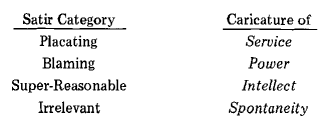
(1) Placater
Words — agree — ("Whatever you want is okay. I am just here to make you happy.")
Body — placates — ("I am helpless.")
Insides — ("I feel like a nothing; without him I am dead. I am worthless.")
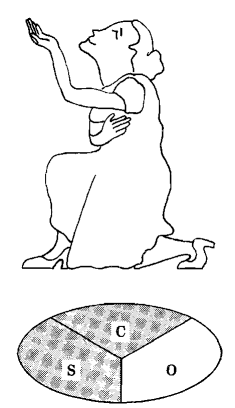
The placater always talks in an ingratiating way, trying to please, apologizing, never disagreeing, no matter what. He's a "yes man." He talks as though he could do nothing for himself; he must always get someone to approve of him. You will find later that, if you play this role for even five minutes, you will begin to feel nauseous and want to vomit.
A big help in doing a good placating job is to think of yourself as really worth nothing. You are lucky just to be allowed to eat. You owe everybody gratitude, and you really are responsible for everything that goes wrong. You know you could have stopped the rain if you used your brains, but you don't have any. Naturally, you will agree with any criticism made about you. You are, of course, grateful for the fact that anyone even talks to you, no matter what they say or how they say it. You would not think of asking anything for yourself. After all, who are you to ask? Besides, if you can just be good enough it will come by itself.
Be the most syrupy, martyrish, bootlicking person you can be. Think of yourself as being physically down on one knee, wobbling a bit, putting out one hand in a begging fashion, and be sure to have your head up so your neck will hurt and your eyes will become strained so, in no time at all, you will begin to get a headache.
When you talk in this position, your voice will be whiny and squeaky because you keep your body in such a lowered position that you don't have enough air to keep a rich, full voice. You will be saying "yes" to everything, no matter what you feel or think. The placating stance is the body position that matches the placating response.
(2) Blamer
Words — disagree — ("You never do anything right. What is the matter with you?")
Body — blames — ("I am the boss around here.")
Insides — ("I am lonely and unsuccessful.")
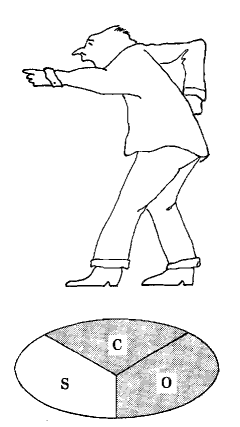
The blamer is a fault-finder, a dictator, a boss. He acts superior, and he seems to be saying, "If it weren't for you, everything would be all right." The internal feeling is one of tightness in the muscles and in the organs. Meanwhile, the blood pressure is increasing. The voice is hard, tight, and often shrill and loud.
Good blaming requires you to be as loud and tyrannical as you can. Cut everything and everyone down.
As a blamer, it would be helpful to think of yourself pointing your finger accusingly
and to start your sentences with, "You never do this, or you always do that, or why do you always, or why do you never ...," and so on. Don't bother about an answer. That is unimportant. The blamer is much more interested in throwing his weight around than really finding out about anything.
Whether you know it or not, when you are blaming, you are breathing in little, tight spurts, or holding your breath altogether, because your throat muscles are so tight. Have you ever seen a really first-rate blamer, whose eyes were bulging, neck muscles and nostrils standing out, who was getting red and whose voice sounded like someone shoveling coal? Think of yourself standing with one hand on your hip and the other arm extended with your index finger pointed straight out. Your face is screwed up, your lips curled, your nostrils flared as you yell, call names, and criticize everything under the sun.
(3) Computer
Words — ultra-reasonable — ("If one were to observe carefully, one might notice the workworn hands of someone present here.")
Body — computes — ("I'm calm, cool, and collected.")
Insides — ("I feel vulnerable.")
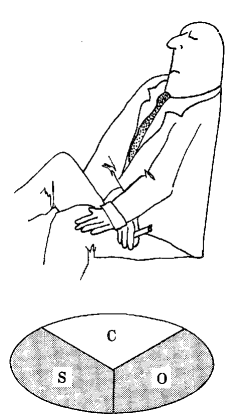
The computer is very correct, very reasonable, with no semblance of any feeling showing. He is calm, cool, and collected. He could be compared to an actual computer or a dictionary. The body feels dry, often cool, and disassociated. The voice is a dry monotone, and the words are likely to be abstract.
When you are a computer, use the longest words possible, even if you aren't sure of their meanings. You will at least sound intelligent. After one paragraph, no one will be listening anyway. To get yourself really in the mood for this role, imagine that your spine is a long, heavy steel rod, reaching from your buttocks to the nape of your neck, and you have a ten-inch-wide iron collar around your neck. Keep everything about yourself as motionless as possible, including your mouth. You will have to try hard to keep your hands from moving, but do it.
When you are computing, your voice will naturally go dead because you have no feeling from the cranium down. Your mind is bent on being careful not to move, and you are kept busy choosing the right words. After all, you should never make a mistake.
The sad part of this role is that it seems to represent an ideal goal for many people. "Say the right words; show no feeling; don't react."
(4) Distracter
Words — irrelevant — (The words make no sense.)
Body — Angular and off somewhere else.
Insides — ("Nobody cares. There is no place for me.")
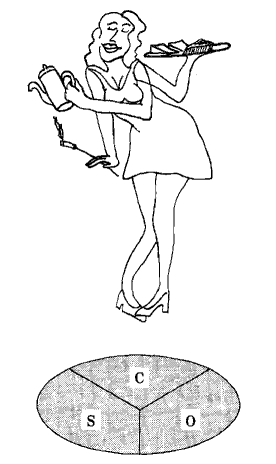
Whatever the distracter does or says is irrelevant to what anyone else is saying or doing. He never makes a response to the point. His internal feeling is one of dizziness. The voice can be singsong, often out of tune with the words, and can go up and down without reason because it is focused nowhere.
When you play the distracting role, it will help you to think of yourself as a kind of lopsided top, constantly spinning, but never knowing where you are going, and not realizing it when you get there. You are too busy moving your mouth, your body, your arms, your legs. Make sure you are never on the point with your words. Ignore everyone's questions; maybe come back with one of your own on a different subject. Take a piece of imaginary lint off someone's garment, untie shoelaces, and so on.
Think of your body as going off in different directions at once. Put your knees together in an exaggerated, knock-kneed fashion. This will bring your buttocks out and make it easy for you to hunch your shoulders and have your arms and hands going in opposite directions.